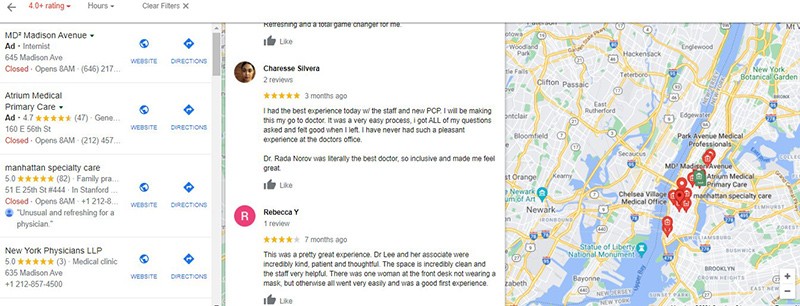In today’s digital world, online reviews have overtaken word of mouth marketing. Online reviews are just as important for the healthcare institutions as they are for any other business. Patients trust online reviews and reviews help them to make a decision to invest in a doctor. So good online reviews mean a good reputation. Online reviews also play a significant role in SEO. Displaying reviews and ratings on a webpage shows that the crawlers understand that customers have taken out time to leave feedback about your services. This will improve ranking and online visibility, leading to better conversion rate and increased sales. Medical SEO services can help physicians improve their result page ranking and good online reviews improve SEO results.
According to a survey by Software Advice about how, why, and when patients use reviews sites, the number of people who use online reviews sites to help select a new physician is growing. This means that it is important for even small healthcare practices to have a strong online presence. The key findings of the survey are:
- A strong online presence is important for your medical practice because the findings show that 90 percent of patients who responded to the survey use online reviews to evaluate physicians.
- Around 71 percent of surveyed patients use online reviews as their first step towards finding a new doctor. This means that your online reputation acts as the first impression that you make on your potential patients.
- Positive review history helps to attract out-of-network patients to your practice; around half of the respondents (43 percent) would go out of their insurance network for a healthcare provider that has positive reviews.
- Only one percent of patients leave “very negative” feedback on reviews sites, and just 10 percent leave “somewhat negative” reviews. Majority of reviews are either positive or neutral and so it is easier to engage with.
- 66 percent of respondents feel it is “very” or “moderately important” for providers to respond publicly to online reviews, so addressing complaints without violating HIPAA laws is a smart strategy.
People consider online reviews as a personal recommendation. Online reviews are a type of user generated content that is heavily monitored by search engines. When people search for a medical practice’s name, they get their first impression about the practice through online reviews. There are many marketing tools like SentiOne, Reputology, Review Push, etc. that help manage online reviews. Some of these systems have communication features that will automatically send out emails asking patients to leave reviews on popular reviews sites after they come in for an appointment.
Here are the ways online reviews help potential patients:
- To Find New Healthcare Providers: Online reviews play a significant role in helping patients find a physician. Most patients go through reviews to decide whether they should book their first appointment with the physician. Physicians can leverage reviews sites as marketing channels and grow their patient base with healthcare CRM software. These system have a dashboard that help you to keep track of metrics and examine the success of your marketing strategies.
- Positive Reviews Attract out of Network Patients: If a healthcare providers has good positive reviews then potential patients are willing to overlook factors like cost convenience and choose that healthcare provider, even if they are out of insurance network.
- Most Patient Post Positive Reviews Online: If you have a large number of positive reviews, then you are likely to attract more patients. This is one of the main reason why healthcare providers ask patients to leave a review. Physicians are concerned about negative reviews, but negative reviews do not happen that often. Make sure to focus on better patient engagement to get more positive reviews from the patients.
- Patients Want a Response for a Negative Review: Most healthcare providers are not sure about how to handle these negative reviews. It is important to respond to negative reviews because it shows your level of engagement and responsiveness. Most patients often overlook negative reviews. So healthcare providers need not worry too much about getting such reviews. If they do, they should respond to them. Here are a few tips on how to respond to negative reviews:
- Never Take it Personally: Some negative reviews can be rude and harsh, but don’t take them personally. Always remember to be courteous and professional when responding to any reviews.
- Be Polite and Offer a Solution: Don’t waste your time trying to debunk or refute unreasonable or untrue reviews. Just try to understand what caused the patient to have the negative experience, acknowledge it, and offer a solution if possible. Do not offer any discounts or offer in response to any negative review because it will encourage people to leave more negative reviews.
- Acknowledge the User’s Concern: Responding to negative reviews in healthcare industry is different from other industries, because you can’t actually confirm whether or not the reviewer visited your practice or was treated by you or your team.
- Patient Often Disregard Unreasonable Negative Reviews: Reviews that are unreasonable or are extremely bad don’t get much attention, and prospective patients are likely to ignore such messages. Some of the reasons for disregarding such negative reviews is that they seem exaggerated, the reviewer’s profile looks suspicious, or the issues in the review does not apply to the healthcare provider or the practice. Patients look at reviews with a critical eye and they will not be easily influenced by fake or untrue reviews.
- Patients Always Consider Quality of Care: Patient consider quality of care when they are evaluating reviews. What they look for can be categorized into three sections: general, delivery of care and administrative. In the general category, patient like to read about other patients’ experiences. In delivery of care category, patients are interested in the accuracy of diagnoses and how well the provider listens to patients. In the administrative category, patients look for how easy it is to schedule an appointment and how friendly they are.
Online review can either make or break your business. Good online reviews help SEO by improving search ranking and attract more potential patients to your practice. Partnering with an organic SEO company can help you manage online reviews and build your reputations.






